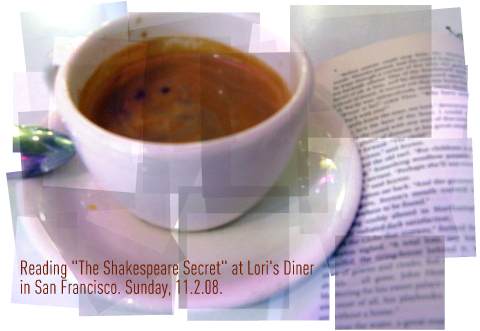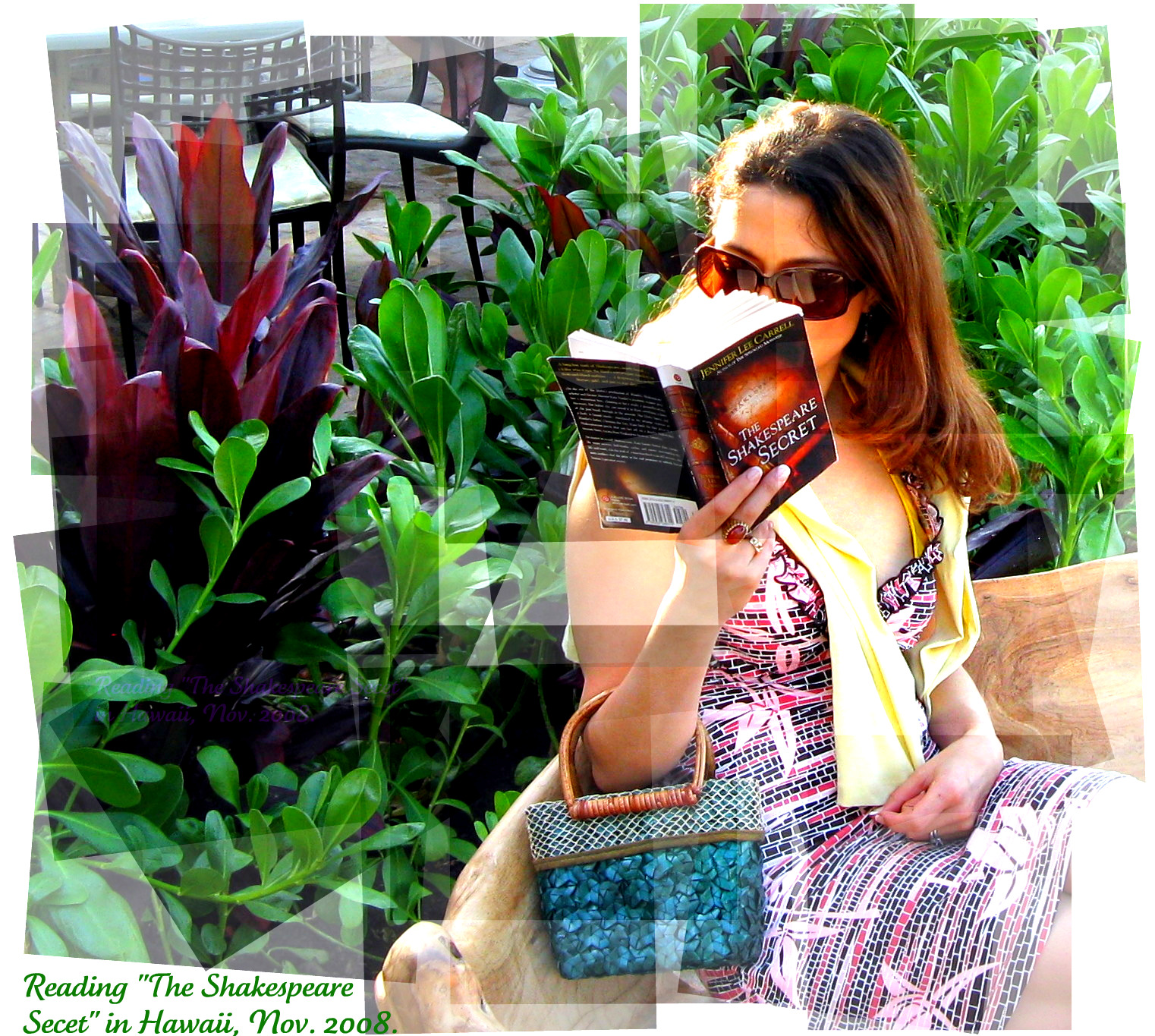The evil that men do lives after them;
The good is oft interred with their bones…
–William Shakespeare

Imagine reading a book filled with quotes, anecdotes, and plots from Shakespeare’s masterpieces!I did not choose to read “The Shakespeare Secret” for the plot or the author. I chose it so I could leaf through bits and pieces of quotes from the bard’s masterpieces, and perhaps get closer to the world of Shakespeare, one that I plan to study in more depth someday.
On the matter of writing style and mastery of language, I think Carrell is a solid author, albeit an extremely difficult one for me to follow. For the record, I have read long intricate novels by one of the first authors who touched me deeply, Ayn Rand, when I was only 16 and I easily kept up with her plots and myriad of characters in both The Fountainhead and Atlas Shrugged, and yet I cannot count how many times I was lost, lost beyond hope, in the pursuit of the Shakespeare Secret. While I appreciated the complexity and depth built into the novel, not to mention the preparation and thorough research of the author, I still find that there were too many subplots at play.
The main theme and story of this book has been found guilty of too much resemblance to Dan Brown’s “Da Vinci Code”, the fascinating plot and theory that has created much excitement in the religious communities ever since its appearance in print. Carrell follows a similar path especially with the strong use of symbology in her story. Nonetheless, I must give her some credit for the storyline. Her book suggests that William Shakespeare of Stratford may not have been the bard after all, and that many others during his time would better fit the description of a man who produced the magnificent body of work that we worship today.
The evidence against Shakespeare is sadly strong — after all, he was not very well educated, and certainly did not come from high society. What business did he have writing some of the most enduring pieces of all time, with no association to royalty, kingship or rank? No, it is all too possible that Shakespeare was not our dear playwright after all. The story suggests theories such as Francis Bacon, Christopher Marlowe, Sir Philip Sidney, Mary Herbert countess of Pembroke and the earls of Southampton, as some of possible authors who wrote under pseudonym of Shakespeare. Another theory tells us about a secret society made up of these elite writers who contributed bits and pieces of the plays and poems, under one name. With the main plot centered around the search for a long lost play of Shakespeare, these subplots around Shakespeare’s real identity sometimes contribute to the intensity of the story, and at other times, over-complicate the plot.
The choice of topic, William Shakespeare of Stratford, innately draws intrigue, mystique and interest. Who among us does not love or find interest and curiosity in a man who wrote Macbeth, Romeo and Juliet, and A Mid Summer Night’s Dream? Who among us cannot admit to utter beauty in the writings of a poet and a playwright that has easily withstood the test of time from the age of Elizabethan English? Who among us does not go weak in the knees, no matter where your position in love and life, when reading:
“Love is not love
which alters when it alteration finds” — Sonnet 116
“Two of the fairest stars in all the heaven,
having some business, do entreat her eyes
to twinkle in their spheres till they return.”
— “Romeo and Juliet”, Act 2, Scene 2
“Shall I compare thee to a summer’s day?
Thou art more lovely and more temperate:
Rough winds do shake the darling buds of May,
And summer’s lease hath all too short a date” — Sonnet 18
Reading is the best pastime for an active mind! If you like to see the other book reviews, check the index of In Print.
Carrell takes us to present day London with our protagonist Kate, a Shakespeare scholar and current director of the Globe on the opening night of “Hamlet”. She has an unexpected visitor, her mentor Roz, from Harvard, with an urgent message which is never fully delivered. It does not take long for Carrell to set events into fast motion with the murder of Roz in a Shakespearean plot, and Kate running after the mystery box and for her life. Kate soon finds out that she is looking for the lost Shakespeare play, Cardenio, and her clue is in the many letters and manuscripts scattered all over the globe, anywhere from Harvard libraries to smallest literary corners imaginable. The author tells us Shakespeare used Cervantes’s novel Don Quixote as an inspiration for his Cardenio, and hence draws a hazy link from Shakespeare to colonial Spanish and the American Southwest.
The story is good and I like Kate’s character and integrity. I like her take on the experience, and her obsession with Shakespeare. She can easily lose track of time and become ignorant of imminent danger to her in the presence of manuscripts and letters leading to clues to bard.
In one of my favorite passages in the book, I marvel at Kate’s experience when she is at the Wilton house. (p.289)

“Shakespeare had passed through that arch, I thought. He had stood on the stones of the court below, gazing up at the sky — would it rain or would it be fine? He had eaten and drunk his fill of ale or maybe wine somewhere within these walls. ……The frisson of presence was something that neither Athenaide nor the Folgers, nor the Globe Trust, with all their bushels and barrels and trunksful of money, could ever re-create. He had been here.”
It is nothing short of the pang of emotions I felt when I walked into the room of the Santa Maria del Grazie in Milano, and before me on the wall, I gazed at the world’s unarguably best masterpiece: Leonardo da Vinci’s “Last Supper”, and the breathtaking beauty of the art before me aside, I could not stop thinking: Leonardo da Vinci was here, in this room, by that wall, working, painting, thinking, breathing, speaking, and being. How marvelous an experience it is that I am in a place where the genius once spent so much time producing this masterpiece.
In its essence, perhaps Carrell intended to give us that experience — a sense of feeling closer to history, and to the great scholar who produced so much for the world. In that, I applaud her.
Fiction or fact, there has always been and will always be only one William Shakespeare for the world to see and read and be mesmerized with.
 I am Farnoosh, the founder of Prolific Living. So glad you are here. My mission is to empower you to unblock your creative genius to live your dream life.
I am Farnoosh, the founder of Prolific Living. So glad you are here. My mission is to empower you to unblock your creative genius to live your dream life.